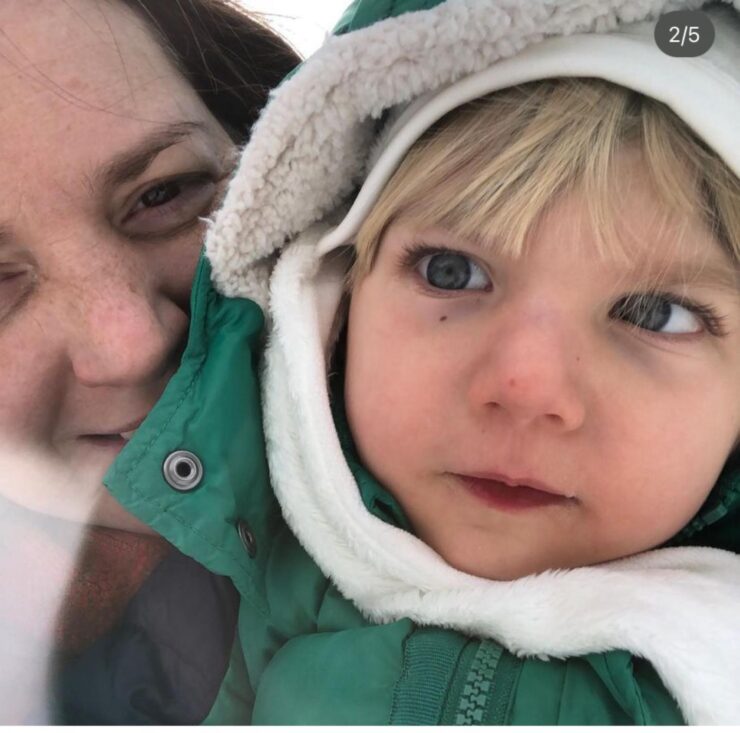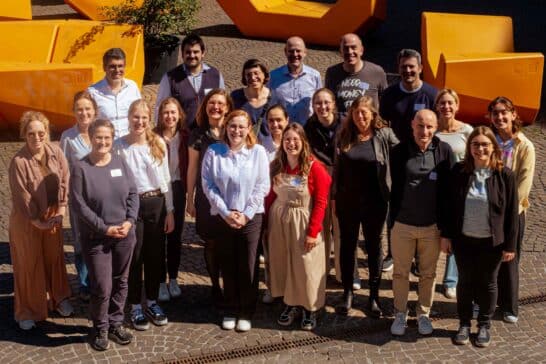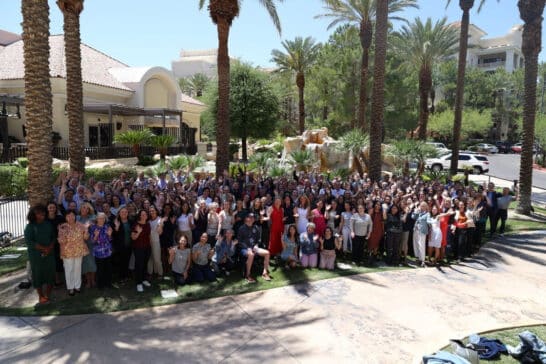„There is a lot of happiness to be found on this journey, but it doesn’t compare to what could/should have been“
In this interview, Anna and Paolo talk about their life with their son Emiliano who has PCH2. They talk about moving between their home country Italy and Turkey and about balancing the challenges of coping with Emiliano’s disability against building a new world for themselves – a world in which happiness can and should have a place alongside all the challenges that the disease brings.
Who is in your family?
We are Paolo, Anna and Emiliano (6 years old), and Emjay, Emiliano’s nanny.
We are Italians living in Istanbul (Turkey), where Paolo works as an employee of an international organization. Although we have a supportive extended family in Italy, we are essentially on our own on this trip. We are supported by Emjay, who has become an integral part of our family and cares for Emiliano as much as we do.
We also have close friends who are always willing to help us and who also share a deep love for Emiliano. We both have jobs, but we can also work from home if necessary. This allows us to be close to Emiliano, especially when he is not at school.
How did your PCH2 journey start?
Emiliano was born with the umbilical cord around his neck. He was treated in an incubator for a few hours and when he was brought into our room, we noticed that he was not feeding from the breast and was shaking badly in both his lower and upper limbs.
After an ultrasound scan of the brain revealed abnormalities, Emiliano was transferred to the neonatal intensive care unit for further examinations. An MRI was also carried out here, which already indicated pontocerebellar hypoplasia. Due to sucking difficulties and oxygen desaturation during feeding, a nasogastric tube was placed.
After a two-month stay in the neonatal intensive care unit, Emiliano was transferred to a rehabilitation center where genetic tests were carried out. When he was seven months old, we received his PCH type 2A diagnosis after genetic testing.
How did you feel during that time? What helped you and what was the most difficult?
In the beginning, we were undoubtedly traumatized. We had to come to terms with the fact that we were going to be hospitalized for an extended period of time, and we had to adjust to the challenge of caring for a child with an extreme disability and a potentially limited life expectancy after discharge from the hospital – a daunting reality.
The hardest part was hearing the doctors tell us over and over again that our son wouldn’t be able to achieve anything in his life and that it was better not to get our hopes up.
Anna sought psychological support, which played a crucial role in reconciling with Emiliano’s diagnosis and shifting our focus to building a new world for ourselves. In this new world, we wanted to always remember to be happy, and we began to challenge the misconception that a (severe) disability is synonymous with a life without meaningful experiences, joy, travel and fulfillment.
It was helpful to get to know other families with disabled children in social networks who showed different positive and fulfilling approaches to living with a disability. In addition, contact with specific groups of people with children with PCH provided valuable support.
What are Emiliano’s symptoms? Have they changed over time?
Emiliano has severe motor and cognitive delays, but thanks to various rehabilitative therapies, we have seen significant improvements. He now has improved trunk and head control, and he is able to stand up and perform some purposeful movements with support.
Remarkably, Emiliano understands instructions (Italian and English) well. He communicates by saying yes/no, expressing his preferences using AAC symbols, moving his head or gesturing with his hand. He recognizes colors, numbers up to 10, some letters and abstract concepts such as big/small.
We have made considerable efforts to rehabilitate Emiliano’s eating and swallowing behavior, so that he is now on a semi-solid diet.
Emiliano suffered from severe reflux, especially when using the feeding tube. Switching to a semi-solid diet has proved effective in significantly reducing the reflux. With careful treatment (including medication), the reflux is mostly under control.
Emiliano has epilepsy, but this is effectively treated with medication. It appears that Emiliano’s seizures are associated with high fevers.
Dystonia affects him considerably, however. He has moderate uncontrolled movements on a daily basis, which can escalate into dystonic crises. These always indicate imminent illness and occur 5-7 times a year.
The dystonia also used to disturb Emiliano when falling asleep. Tetrabenazine has proven to be extremely effective for this particular issue, as it significantly reduces the duration of the dystonic episodes while falling asleep. However, it has only a limited effect on his uncontrolled movements during the day.
What helps you to manage your daily life as a family?
Our nanny, who cares for Emiliano completely independently. She skillfully looks after all of Emiliano’s needs and actively participates in his daily therapy at home. She also enables us to take short breaks, usually 2-3 times a year. These are very important for us as parents, as they allow us to regain our strength and turn to Emiliano with renewed energy and focus.
What are the greatest challenges you face in daily life?
The hardest part is when Emiliano, for whatever reason, can’t sleep for several days in a row.
In addition, living in between two countries is beginning to cause difficulties. The logistics and accommodation while traveling can be quite challenging.
What does a normal day in your family look like?
During the week, we wake up and start our day at around 7:30 a.m. While Anna prepares breakfast, Paolo and Emiliano cuddle up in bed together. Emiliano needs to take his medication before breakfast. After breakfast, Anna plays with Emiliano, then bathes him and dresses him. Emiliano then usually sleeps again for about 30 minutes.
Around 10 a.m. Anna takes Emiliano to school and we both work until around 7 p.m.
When Emiliano returns from school at around 4:30 p.m. with his nanny Emjay, there is time for rehabilitation therapy, playing or bathing. Emiliano is also provided therapy at school twice a week.
Anna usually takes care of feeding Emiliano and then the three of us eat dinner together, with Emiliano sitting in his special chair next to us. After dinner, we cuddle and play for a while. Emiliano then takes his medication and goes to bed at around 8:30 p.m.
Can you tell us about your favorite moments as a family?
Waking Emiliano, lying in bed together and cuddling is one of our favorite moments.
We are lucky to be able to work from home and be flexible when needed, so we can also enjoy the moments when Emiliano comes back from school. In these moments he talks enthusiastically about his experiences and describes them in his own language. Emiliano is incredibly vocal when he is in a good mood (and Emjay helps us to “translate” his words).
We spend more time with Emiliano on the weekends and we really value it. Whether we’re playing with him in bed, tickling him or reading him stories, his laughter brings endless joy into our lives and creates precious memories that are close to our hearts.
What has changed over time and how are you doing as a family today?
The beginning was a big challenge. In the first year, Paolo was mainly in Turkey while Anna stayed in Italy with Emiliano, as we were not able to move with little Emiliano. When we finally became more mobile (Emiliano was 11 months old), everything started to improve. We gradually shifted our focus from learning to deal with the disability to leading a normal family life.
Of course, living with this disability is not easy. There are times when we are exhausted from sleepless nights, times when we spend more time in hospital than at home, but in general we are happy. We love one another very much, and we are surrounded by an incredible amount of love, happy moments, and nice people who are always ready to help us.
Emjay, who is like a mother to Emiliano, helps us immensely and we are so happy that our paths have crossed.
It is necessary to plan things in advance, but so far we have managed to accomplish almost everything we planned. Emiliano has had many positive experiences: He has traveled to 10 different countries, tried to ride a pony, enjoyed hot springs, reached altitudes of almost 3,000 meters and ridden with us in his bicycle cart.
We are aware that things will get more complex as Emiliano grows up. Traveling by plane, for example, has become more complicated and requires a lot more organization. In addition, tasks such as lifting Emiliano, who is getting heavier every day, present new challenges that we are overcoming as a family.
Is there anything you wish for Emiliano?
We hope that Emiliano will continue to be surrounded by the love of his family and friends. We wish that his life is filled with positive experiences. We also hope that his condition does not deteriorate into something that is more difficult to manage and, above all, more painful for him.
What is great about Emiliano?
Many things are really great about Emiliano, but perhaps his laughter (he laughed for the first time when he was 11 months old) is the greatest.
And the inner strength he gives us. Just knowing that our child is getting through each day, despite the very difficult conditions he has, makes us feel that every other problem we face is not as important.
What advice would you like to give to the parents of a child who has just been diagnosed with PCH2?
It is indeed a long road, but if you focus on the moments and take things one step at a time, you can get things under control.
Don’t hesitate to ask others for help! Try to build a supportive network around you!
There is a lot of happiness to be found on this journey, but it doesn’t compare to what could/should have been.
„Don’t hesitate to ask others for help!“
(Anna und Paolo)
Share your own story
to support and encourage other families on their journey.


